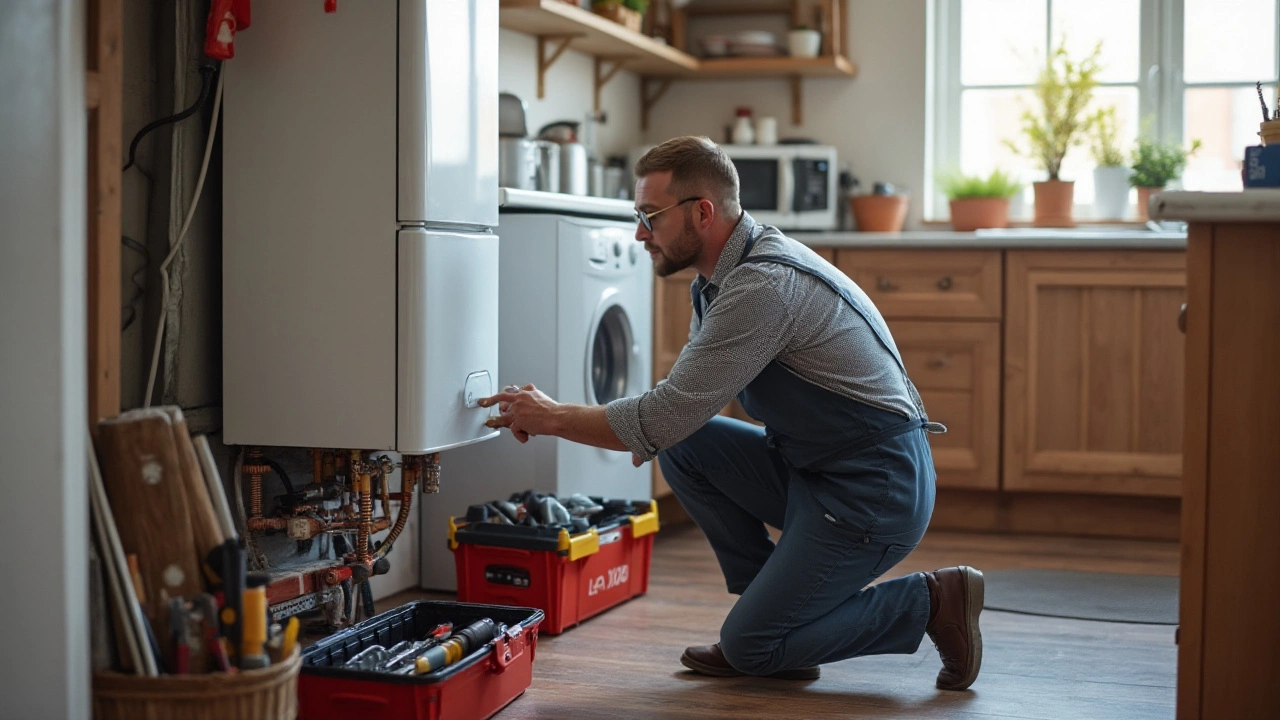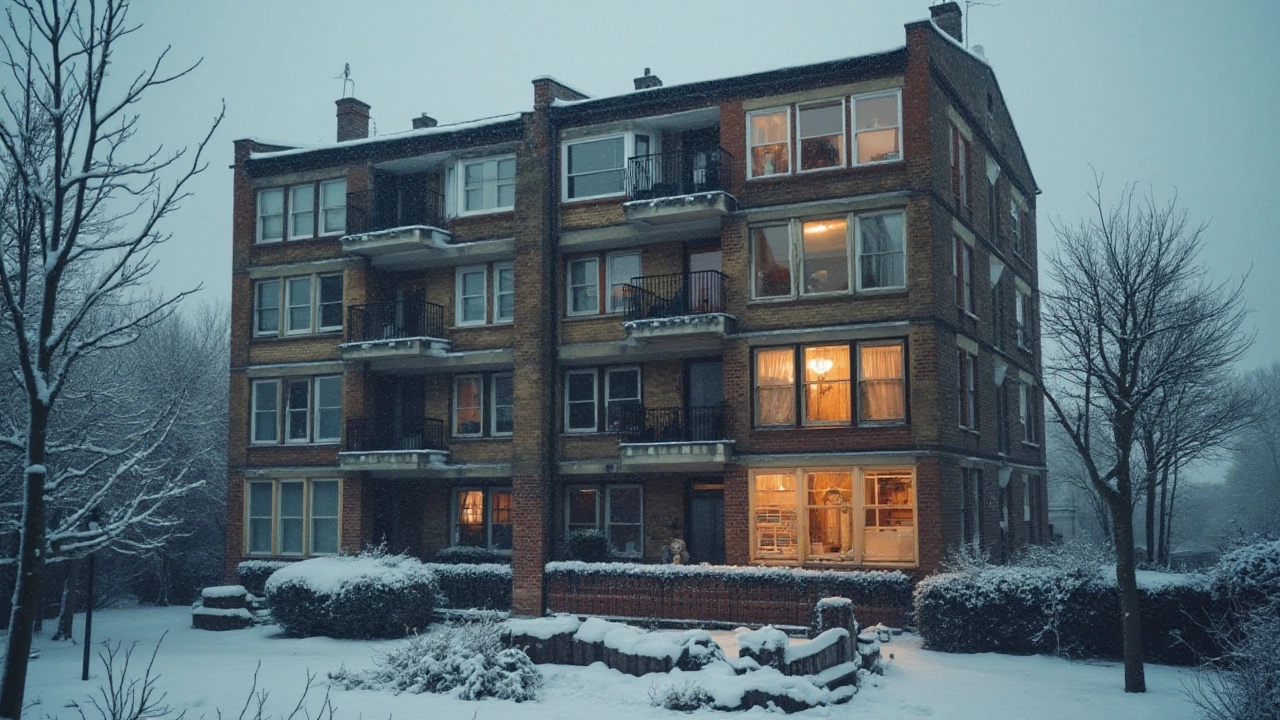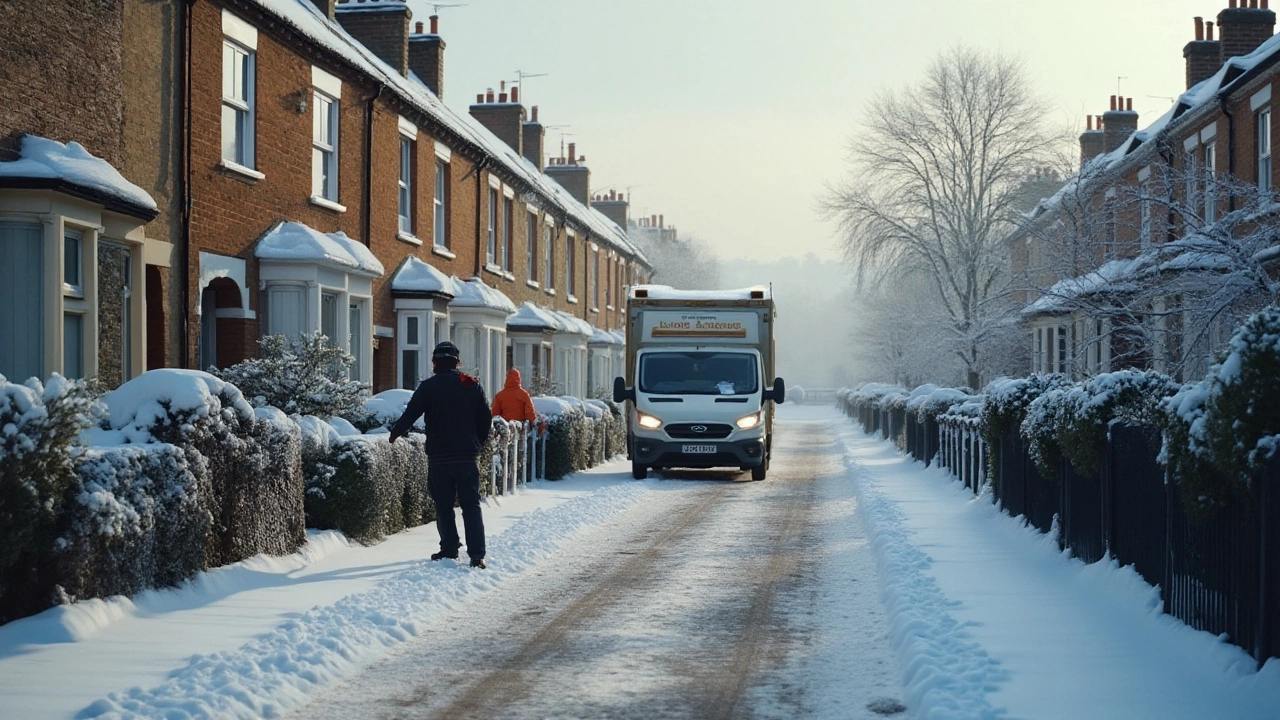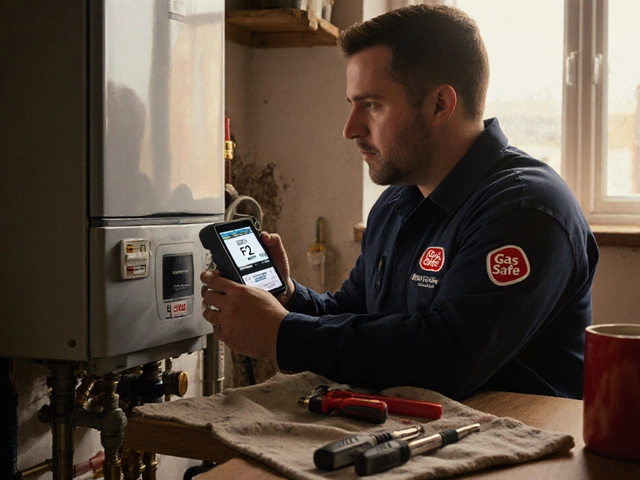A boiler humming along in the background often goes unnoticed, that is, until it stops working. The question of whether a broken boiler is an emergency can have a few layers. With winter chill creeping in, the discomfort of a chilly home is just the beginning of concerns. Beyond mere temperature drop, there are other issues that demand immediate attention.
Let’s unravel the complexity surrounding a malfunctioning boiler, exploring the pressing nature of the problem and when you might need to dial for urgent repairs. It's not just about discomfort; leaving a faulty boiler unattended can have bigger implications. This guide will edge you closer to keeping your home warm and your worries at bay.
- Determining the Severity of a Boiler Issue
- Common Causes of Boiler Breakdowns
- Immediate Steps to Take for Boiler Malfunctions
- Preventative Measures and Maintenance Tips
Determining the Severity of a Boiler Issue
Imagine this: it's a frosty January night, snowflakes are swirling past your window, but instead of basking in a cocoon of warmth, you're shivering because your faithful boiler has just given up the ghost. The first question that likely flashes across your mind is whether this malfunction qualifies as an emergency. This isn't an easy question, often layered with multiple considerations, but understanding the nuances can save a world of hassle. First, recognize that the severity of the issue often hinges on how essential your heating system is at that moment. If it's twenty degrees below outside, the lack of heat could pose immediate health risks, particularly to young children, the elderly, or those with health conditions. These situations certainly tip the scales toward an emergency.
However, there's more to consider. Sometimes, a *broken boiler* can present silent dangers. A sudden shutdown could point to a gas leak or even a carbon monoxide issue, the latter of which has been dubbed the 'silent killer'. Reports from health agencies suggest that thousands suffer from carbon monoxide poisoning annually. Earlier this month, an article in Home Safety Magazine noted, "Unchecked boilers pose potential risks beyond inconvenience; knowing when to call for help can make all the difference". If your carbon monoxide detector—a gadget essential in any home—sounds an alarm, you're facing a critical emergency. But what if your boiler just makes odd sounds or doesn’t seem as efficient? Such symptoms might indicate developing problems, not necessarily emergencies, yet they are worth addressing promptly before they worsen.
Consider specific indicators of boiler health beyond the obvious. Does the boiler emit strange noises, such as loud banging or clunking? This could indicate kettling, usually caused by limescale buildup obstructing water flow within the heat exchanger. While not immediately dangerous, the inefficiency could escalate repair costs. A boiler that cycles on and off frequently might have thermostat issues or low water pressure, detectable by checking pressure gauges and thermostat settings. Also, keep an eye out for leaks around the unit. Water leakage might seem benign, yet it can quickly lead to corrosion or damage to electrical components, necessitating more costly *boiler repair*. You see, evaluating the problem’s severity involves not just assessing immediate consequences but also considering long-term repercussions.
Essentially, the timing of the malfunction often dictates urgency. If your boiler fails just as severe weather warnings flash across screens, the immediate need for reliable heating supersedes minor malfunctions. Here, perception meets practicality: you must gauge your comfort threshold, household needs, and any vulnerabilities that turning up without heat might exacerbate. Be it freezing pipes or respiratory issues, context is everything. Should you decide the problem is urgent—or even marginally inconvenient—it often warrants an emergency call-out to a service provider, who is better equipped to judge the stakes. It’s wise to have an understanding with a trusted local technician, ensuring they’re quick to respond when ordinary issues metastasize into emergencies. At the end of the day, such foresight aids in resolving problems efficiently, curbing avoidable risks when temperatures slide down the scale.

Common Causes of Boiler Breakdowns
When it comes to the inner workings of a boiler, several factors can lead to its breakdown. Understanding these causes not only helps in prevention but also provides a deeper appreciation of the system’s complexities. A prevalent cause of boiler issues is inadequate maintenance. Over time, without regular check-ups, minor issues can escalate into significant problems. Dust and debris accumulation inside the system can cause blockages, reducing efficiency and eventually leading to a failure.
Another common culprit is thermostat malfunctions. A boiler’s thermostat is critical in regulating temperature, and when it goes on the fritz, it can cause erratic heating or no heating at all. Boiler repair professionals often find that older thermostat models are more prone to breakdowns, pointing to the necessity for timely upgrades. Moreover, airlocks too are problematic as they inhibit the circulation of water within the system, causing parts of the radiator to stay cold despite the boiler being on.
Leaks within the system are another pathway to failure. Leaks may occur from various parts, including the pipes leading to and from the boiler, the pressure relief valve, or even the heat exchanger. They not only hurt the system's efficiency but also lead to increased water bills if not detected early. Poor installation or outdated parts are often at the heart of these leaks. Dr. Lisa Fenwick, an expert in residential heating systems, once noted,
“Ignoring small leaks in a heating system is akin to ignoring cracks in a dam. The outcome, if left unchecked, can be catastrophic.”
The issue of low pressure adds another layer of potential breakdowns. Boilers require a certain level of pressure to operate effectively. When the pressure is too low, the system might automatically shut down to prevent damage. This scenario often points to a leak as the cause or sometimes even bleeding radiators too frequently without adequate refilling. On the topic of bleeding radiators, if this is required more frequently than expected, it might indicate that the system is sucking in air due to a pressure imbalance.
With modern-day boilers being sophisticated owing to electronics and controls, electrical faults have their fair share of causing malfunctions. These can range from faulty wiring, blown fuses, to circuit board failures. Such problems are often best handled by professionals due to their complexity and potential safety risks. It’s essential to remember that some electrical issues could also connect to other home electrical systems, which is why regular inspections are vital.
Ultimately, the adage ‘prevention is better than cure’ holds particularly true when dealing with boiler and heating systems. Householders should be encouraged to familiarize themselves with the manufacturer’s guidelines and adhere to suggested check-up schedules. Heating system education plays an invaluable role in mitigation, helping avoid unexpected failures and ensuring comfort during those nippy months. Understanding these core issues can go a long way in keeping your home's heat steadily humming through the cold seasons.

Immediate Steps to Take for Boiler Malfunctions
A broken boiler can strike panic into the hearts of many homeowners. Yet, staying calm and knowing exactly what to do can make all the difference. First and foremost, when dealing with a malfunctioning boiler, it’s crucial to ensure safety before anything else. Begin by checking if there are any visible signs of leaks or gas smells around your heating system. If you detect any unusual odors, your first step should be to evacuate the premises and, from a safe distance, contact professionals who can assess and manage the situation safely. Fires and gas leaks are rare, but they can be incredibly dangerous if ignored.
Once safety is confirmed, it’s time to look for potential low-hanging fruit solutions that don’t require expert intervention. Make sure your thermostat is functioning correctly, as sometimes a simple adjustment to the settings can remedy the issue. Inspect the boiler's pressure gauge, as this often indicates if water pressure needs attention. For boilers, maintaining a pressure between 1 and 2 bars typically ensures optimal function. If it’s lower than necessary, you might need to top it off following the manufacturer's instructions. All these steps can help determine if the problem is significant or just a quick fix.
"Ensuring household safety and efficiently addressing heating issues begins with understanding the immediate steps you need to take," says Linda Evans, a respected figure in home maintenance consulting.
Never underestimate the power of a good old reset button. Many newer boiler models have these built-in for troubleshooting common issues. It's akin to restarting a stubborn computer, sometimes clearing minor technical glitches. However, it’s prudent to consult your boiler's manual before hitting reset, as doing so without proper knowledge might exacerbate certain malfunctions. Once a reset is done, monitor your boiler closely to see if the issue reoccurs or persists.
For those moments when confusion covers your rightful steps, having a checklist can be remarkably beneficial. Make a note of any error messages displayed on the boiler screen, as many are equipped with diagnostic displays that offer clues. This information will be invaluable when you eventually consult a professional, allowing them to diagnose more efficiently without playing detective. It’s often these overlooked small details that expedite repairs significantly.
Furthermore, if the boiler issue occurs during the off-hours of a repair service, and an emergency call-out seems excessive, temporarily using alternative heating sources like portable heaters can offer some relief. Just be mindful of their safe placement to avoid any accidental hazards. Remember to inform family members to bundle up and utilize insulated blankets to maintain warmth in the short term. Dealing with a faulty boiler might be a hassle, but patiently taking these initial steps ensures the problem is addressed appropriately.

Preventative Measures and Maintenance Tips
Regular maintenance of your heating system is the secret sauce to avoiding unexpected boiler breakdowns. It might sound like a chore, but taking care of your boiler can save you a bundle in repair costs and keep your home cozy during those cold months. Start by scheduling annual check-ups with a certified technician. This simple step can address potential issues before they snowball into emergencies. Technicians can spot worn-out parts, troubleshoot minor glitches, and ensure that your boiler operates at its peak efficiency. Consider it akin to taking your car for a service; it just makes sense.
But professional help isn't all there is to it. Homeowners can take proactive steps, too. One useful tip is to bleed your radiators regularly. This process releases trapped air that often causes uneven heating. Have you ever noticed some radiators feeling warmer than others? Bleeding ensures even distribution of heat, saving energy and improving comfort. To bleed your radiators, make sure your heating system is off and cold. You’ll need a radiator key; simply turn it until you hear a hissing sound signaling air escape until water begins to drip. It's straightforward, yet extremely effective.
You might be surprised at how much attention your boiler repair needs are dictated by water quality. Hard water can be a real menace, leading to limescale build-up that clogs the pipes. Check for evidence of white chalky deposits around faucets; if present, consider fitting a water softener to mitigate these effects. Limescale not only reduces the efficiency of your boiler but may also result in costly repairs. Remember, a system free of scale often uses less energy, translating to lower utility bills.
Also, maintaining the correct pressure in your boiler is vital. If the pressure reads below the recommended mark, your heating system may not work as efficiently. To top up your boiler pressure, consult the instruction manual which usually provides easy-to-follow steps. But be cautious not to exceed the suggested range. Keeping the manuals handy is beneficial because they provide crucial insights into troubleshooting minor inconveniences.
Aside from these hands-on tips, here’s a nugget of wisdom: invest in a carbon monoxide detector. Boilers sometimes emit carbon monoxide without warning. This odorless and colorless gas can be harmful, even fatal. With a detector, you'll receive an alert if dangerous levels are present, providing you with peace of mind. A reputable source, The Gas Safe Register, stresses this point:
"Fitting an audible carbon monoxide alarm can be life-saving, providing a crucial early warning of any risks."
Adhering to these preventative measures means you're not just guarding against emergency breakdowns. You're actually prolonging the lifespan of your boiler, enhancing its efficiency, and even helping the environment by reducing energy consumption. The more you nurture your boiler with a healthy regime of upkeep, the fewer surprises you'll face in the dead of winter. And possibly, you will avoid searching for urgent emergency repairs at the most inconvenient times. By taking early steps and being proactive, peace of mind and a warm home are easier to achieve than you might think.




